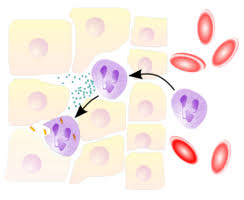The immune system reacts similarly to a high fat and high calorie diet as to a bacterial infection. This is shown by a recent study led by the University of Bonn. Particularly disturbing: unhealthy food seems to make the body’s defenses more aggressive in the long term. Even long after switching to a healthy diet, inflammation towards innate immune stimulation is more pronounced. These long-term changes may be involved in the development of arteriosclerosis and diabetes, diseases linked to Western diet consumption.
The scientists placed mice for a month on western diet- high in fat, high in sugar, and low in fiber. The animals consequently developed a strong inflammatory response throughout the body, almost like after infection with dangerous bacteria. The unhealthy diet led to an unexpected increase in the number of certain immune cells in the blood of the mice, especially granulocytes and monocytes. This was an indication for an involvement of immune cell progenitors in the bone marrow.
Bone marrow progenitors for major immune cell types were isolated from mice fed a western diet or healthy control diet and a systematic analysis of their function and activation state was performed.
Genomic studies show that the western diet had activated a large number of genes in the progenitor cells. The genes affected included those responsible for proliferation and maturation. Fast food makes the body to activate strong immune system. When the researchers offered the rodents their typical cereal diet for another four weeks, the acute inflammation disappeared.
What did not disappear was the genetic reprogramming of the immune cells and their precursors, many of the genes that had been switched on during the fast food phase were still active after four weeks. It has only recently been discovered that the innate immune system has a form of memory. After an infection, the body’s defenses remain in an alarm state, so that they can respond more quickly to a new attack-this is “innate immune training.” In the mice, this process was not triggered by a bacterium, but by an unhealthy diet.
The scientists were further able to identify the responsible “fast food sensor” in immune cells. They examined blood cells from 120 subjects. In some of the subjects, the innate immune system showed a particularly strong training effect. In these subjects, the researchers found genetic evidence of the involvement of a so-called inflammasome. Inflammasomes are key intracellular signaling complexes that recognize infectious agents and other harmful substances and subsequently release highly inflammatory messengers.
The activation by Western diet changes the way in which the genetic information is packaged. The genetic material is stored in the DNA and each cell contains several DNA strands, which together are about two meters long. However, they are typically wrapped around certain proteins in the nucleus and thus many genes in the DNA cannot be read as they are sinaccessible.
Unhealthy eating causes some of these normally hidden pieces of DNA to unwind, similar to a loop hanging out of a ball of wool. This area of the genetic material can then be read much easier as long as this temporary unwrapping remains active. The inflammasome triggers such epigenetic changes, the immune system consequently reacts even to small stimuli with stronger inflammatory responses.
These inflammatory responses can in turn accelerate the development of vascular diseases or type 2 diabetes. In arteriosclerosis for example, the typical vascular deposits, the plaques, consist largely of lipids and immune cells. The inflammatory reaction contributes directly to their growth, because newly activated immune cells constantly migrate into the altered vessel walls.
When the plaques grow too large, they can burst, leading to blood clotting and are carried away by the bloodstream and can clog vessels causing stroke or heart attack. Wrong nutrition can thus have dramatic consequences. In recent centuries, average life expectancy has steadily increased in Western countries. This trend is currently being broken for the first time: Individuals born today will live on average shorter lives than their parents.
haleplushearty.blogspot.com



